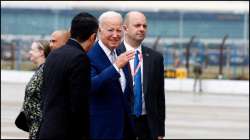G20 Summit 2023: US President Joe Biden departs for Vietnam as 'successful' event nears conclusion
Biden and Vietnamese General Secretary Nguyen Phu Trong will meet in Hanoi and are expected to announce plans to tighten economic cooperation.

G20 Summit 2023: US President Joe Biden departed from New Delhi for Vietnam on Sunday as the successful G20 Summit is approaching a conclusion. Prior to his departure, Biden was among the leaders who came to Rajghat in New Delhi to pay tributes to Mahatma Gandhi.
PM Modi was seen welcoming the dignitaries with an 'angvastram' with an image of Gandhi's Sabarmati Ashram in Gujarat, which was his home from 1917 to 1930. He also explained the signficance of the ashram to the G20 leaders.
"At a moment when the global economy is suffering from the overlapping shocks of the climate crisis, fragility, and conflict, this year’s Summit proved that the G20 can still drive solutions to our most pressing issues," said Biden in a post on X (formerly Twitter).
Notably, India scored a diplomatic win after G20 leaders adopted the New Delhi Declaration with 100 per cent consensus, including on Russia-Ukraine war overcoming differences. Prime Minister Narendra Modi announced about a consensus on 37-page declaration and its subsequent adoption at the start of the second session on Day 1 of G20 Summit in New Delhi.
"History has been created with the adoption of the New Delhi Leaders' Declaration. United in consensus and spirit, we pledge to work collaboratively for a better, more prosperous, and harmonious future. My gratitude to all fellow G20 members for their support and cooperation," PM Modi said later on X.
India-US bilateral cooperation
On Friday, Biden participated in bilateral talks with Prime Minister Narendra Modi, where the two leaders pledged to "deepen and diversify" the bilateral major defence partnership while welcoming forward movement in India's procurement of 31 drones and joint development of jet engines.
In their over 50-minute talks, the two leaders deliberated on India's G20 presidency, cooperation in nuclear energy, critical and emerging technologies such as 6G and artificial intelligence, and ways to fundamentally reshape multilateral development banks. A joint statement issued after bilateral talks between the two leaders also said the Prime Minister looked forward to welcoming the US President to the next Quad Leaders' Summit to be hosted by India in 2024.
Biden on India-Middle East-Europe economic corridor
Speaking on the historic India-Middle East-Europe Corridor launched by PM Modi on Saturday, Biden said that it is "a big deal" and that the US will work with its partners to invest in building sustainable, resilient infrastructure, and making quality infrastructure investments.
"Building sustainable, resilient infrastructure, making quality infrastructure investments and creating a better future... Last year, we came together as one to commit to this vision. And this afternoon I want to highlight the key ways in which the United States and our partners are working to make this a reality. Economic corridor. You're going to hear that phrase more than once, I expect, over the next decade. As we work to address infrastructure gaps across low-middle-income countries, we need to maximize the impact of our investments," he said.
The India-Middle East-Europe Economic Corridor will consist of two separate corridors, the East corridor connecting India to West Asia/Middle East and the Northern corridor connecting West Asia/Middle East to Europe.
Biden's visit to Vietnam
After the G20 Summit, Biden is looking to demonstrate to the world during a stop in Vietnam that the United States and its like-minded allies are better economic and security partners than China.
Afterward the summit, Biden and Vietnamese General Secretary Nguyen Phu Trong will meet in Hanoi and are expected to announce plans to tighten economic cooperation and for a strategic partnership.
Vietnam and China have robust trade relations, but also deep differences. Vietnam, like Malaysia, the Philippines, Taiwan and Brunei, has been in a tense territorial standoff for decades with China, which has claimed authority over waters in the South China Sea that are hundreds of miles from the Chinese coastline.
(with agency inputs)

